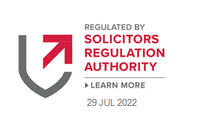Grandparent’s Rights
Our friendly family law specialists are here to help. Contact us today to book an appointment.
A short sharp way of beginning this blog post is to say there really isn’t such a thing as the rights of a grandparent. However, that is not to say that grandparents do not have a place in the legal process when it comes to their relationship with their grandchildren.
There are two main types of cases where grandparents will become involved:
Public – These are cases brought to the court by a Local Authority when there are concerns over the care of a child.
Private – These are disputes between parents or another party about who has a relationship with a child and how that relationship will work.
Public
These cases arise out of the Children Act 1989 when a Local Authority is considering whether a child is at risk living with their current carer and if they need to consider placing the child to live elsewhere. The child always has their own representative. The Local Authority has an obligation to consider all alternative places that a child could live although there is a preference for a child to remain within the family wherever possible. To ensure this is possible the court will look first to undertake assessments of all people put forward to care for the child or children. It is important that the Local Authority is made aware that you want to be assessed. If the assessment is negative, it is open to the persons reported on to ask to be joined to the proceedings so that they can challenge the report.
If the court considers that there needs to be an order as to where the child lives, they can made a Special Guardianship order that the child lives with you. This means that the parents keep parental responsibility but the special guardian has super parental responsibility which can override parental responsibility. There is also a support package put in place by the local authority.
An alternative is that the children are fostered to the relevant person. This means that the Local Authority has parental responsibility and continued involvement from the Local Authority. There is also a fostering allowance.
It is also possible for applications to be made to just see (historically called ‘contact’) the child being placed.
Private
These cases also arise out of the Children Act 1989 and look at situations in which a person wants to apply for a Child Arrangements Order that: (a) a child to live with them or (b) a child to spend time with them. You can make an application for a Child Arrangements Order if:
- You have parental responsibility (i.e. are a parent or special guardian)
- Child has lived with you for one year preceding the date of the application (relative rule).
- If the child is in the care of a Local Authority and they consent to an order being made in your favour.
- If the people with Parental Responsibility consent to an order being made.
If none of these are applicable to you then you can still apply albeit you will need leave of the court for your application.
When applying for leave the court will look at what your application is about, your connection with the child, and whether your application is likely to cause harm to the child.
If you obtain the leave of the court, the process is as a normal application if you were a parent. The court’s paramount concern will be the welfare of the child. They will investigate what is in that child’s best interests and how a relationship could work. They may consider asking CAFCASS (Children and Family Court Advisory Support Service) to investigate the situation and write a report. They may consider asking the child directly what their views are if the child is considered competent to give an independent view.
The court will list a First Hearing Dispute Resolution Appointment (FHDRA) to see if issues can be resolved. The process differs from court to court but the court will tend to have a CAFCASS officer on hand to assist. They will have spoken to the parties before the hearing to determine if there are safeguarding issues (for instance drug addition, domestic violence, criminal convictions or anything else that may place a child at risk of harm) and produced a letter to the court to that end (called a Schedule 2 letter). Some courts also have a mediator on hand to try to help reach agreement.
If agreement cannot be reached at that hearing, directions will be given. Directions are a list of jobs that need doing before the next hearing to move matters forward. The case will then be listed for a Dispute Resolution Appointment (DRA) to once again try to broker agreement. If that fails the court will list the matter for a longer hearing called a Final Hearing at which time they will determine the dispute for the parties
We are accredited and approved.
Bellwether Solicitors is authorised and regulated by the Solicitors Regulation Authority under SRA number 627330.
We are subject to the rules set out in the SRA Standards & Regulations, which can be accessed here.
We are proud members of Resolution.
Emma Kirkaldie is listed as a Leading Lawyer by Wiselaw.



